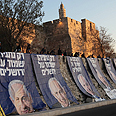
Voting Right, getting Left
Op-ed: Media will once again demand that next government implement policies rejected by the people
As always, following Tuesday's election the media will demand that the victorious Right implement the policy of the Left, which was rejected by the people. The supporters of the national camp never imagined that by voting they would be appointing Ehud Barak, the enemy of settlements, as defense minister, the position that determines most the fate of their precious enterprise. They never imagined Prime Minister Netanyahu would deliver the speech he did at Bar-Ilan University. Therefore, the media's expectations are based on facts, and after the elections this Israeli invention, which distorts democracy, will once again be employed.
But there is punishment for the crime: For Netanyahu's "two states" speech and Lieberman's willingness to evacuate his home in the Nokdim settlement, Likud is paying with a drop to 32-35 Knesset seats (according to the polls). Shas is still paying for its support of the Oslo Accords, and MK Orlev lost his Knesset seat for his late response regarding his role in the decisive vote on the Disengagement.
What can a Likud voter expect? A Palestinian state, as promised by the head of the party in pre-election interviews, or the burial of the "two-states" concept due to the fact that there would never be a majority within the party in support of a Palestinian state.
The new alternative, Habayit Hayehudi, does not remove the doubt entirely. While party leader Naftali Bennett rejects the idea of a Palestinian state, the party itself – as stated by Bennett's deputy Uri Ariel - will join the government and maintain its freedom to vote independently only on issues related to the settlement enterprise in Judea and Samaria.
Is this what Habayit Hayehudi voters want? That their party will join a government that will negotiate on the very heart of the Land of Israel and then leave when Netanyahu will already have the majority he needs due to the support of Meretz and the Arab MKs?
On the other hand, the voter should not take into consideration all the attacks on Netanyahu, such as the claim that he is hated by Obama and disliked by a number of European leaders. Remember, Ariel Sharon became a hero in the eyes of the West only he after he began uprooting what he had built.
The deficit also drew a lot of criticism, with many asking "Where did 39 billion shekels go?" As though Iron Dome, submarines, an electronic fence along the southern border and a war called "Pillar of Defense" do not cost money. Billions more went to the war against an atomic Iran (Olmert disputes the necessity of this war), financing free education for children aged three years and over and the reduction of various taxes. In summation, Netanyahu acquiesced to the Left's demand to "do something for the benefit of the people" by increasing the deficit.
Yesh Atid voters also have a problem. If, as Yair Lapid claimed, the Tower of David is more important than the Azrieli Towers, then what is his call to negotiate and withdraw from all of Judea and Samaria (apart from the large settlement blocs) worth? Who will believe that Lapid seriously believes that even one Palestinian partner can be found who will be willing to give up Jerusalem?
Only in the smaller factions, the ideological factions, everything is clear. But they will not be part of the next government, where decisions are made and influence is exerted. But the smaller parties still have a role in Israeli democracy: They determine the position of the Center; the same mythological Center everyone is trying to woo. Because as the smaller parties become more radical, so does the Center.










